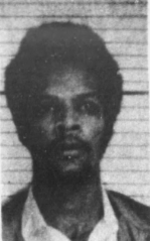 Tallahassee Democrat Tried together in 1971, Dave Roby Keaton and Johnny Frederick were both convicted of the murder of a deputy sheriff during a grocery store robbery in Quincy, Florida. Both men were exonerated two years later based on the conviction of three other men for the crime. On September 18, 1970, two deputy sheriffs assigned as jailers in Leon County, Thomas Revels and Hallie M. Carroll, entered Luke's Grocery Store during the commission of a robbery by three black males. The deputies were ordered to lie on the floor with four other victims of the robbery. When one of the robbers stated “We are going to kill everybody in here and start with the women,” Deputy Revels jumped up and a struggle ensued with one of the assailants. Deputy Revels was shot twice during the struggle, once in the back of the head. In an effort to assist Deputy Revels, Deputy Carroll was shot twice as well. Deputy Carroll survived the shooting and Deputy Revels was pronounced dead on arrival at the hospital. The gunmen escaped. On January 10, 1971, Dave Roby Keaton was called in for questioning. After three days of interrogation by state officials and local police, Keaton confessed to the crime. Two of the confessions were recorded on different days. On January 13, 1971, Keaton gave an oral confession to Joe Townsend of the Florida Department of Law Enforcement. Keaton confessed only after Mr. Townsend told him that the lie detector test indicated that Keaton had been involved in the crime. Later on the same day, Keaton gave a detailed recorded confession to Lt. Melvin Terry of the Leon County Sheriff’s office. On January 14, 1971, Keaton gave another recorded confession to Capt. Lavelle Pitts of the Leon County Sheriff’s office. On January 14, 1971, Johnny Frederick was arrested without a warrant, and questioned all night until he finally confessed to the crime in the early morning hours of January 15, 1971. The confessions provided a detailed description of how Keaton, Frederick and the other codefendants committed the robbery. In total, six black men were arrested and charged with the crime. The six men were Alfonso Figgers, Johnny Lee Burns, David Charles Smith, and John Allen Britt, as well as Frederick and Keaton. Britt later proved to have an out-of-state alibi. The remaining five were sometimes referred to as “The Quincy Five”. The grand jury indicted all five men on January 28, 1971. Keaton and Frederick were tried together in early May 1971. The State played both of the recorded confessions at the trial. Eyewitnesses also identified Keaton and Frederick as participants in the robbery. The defense asserted that the confessions were coerced and had been recanted. The defense recounted how Keaton was held for five days before being allowed to make a phone call or otherwise contact his family or legal counsel. During this time, he was subjected over and over again to long interrogations by the police, and coerced into taking lie detector tests. The confessions of both men contradicted the facts of the crime in many ways. On May 6, 1971, Keaton and Frederick were found guilty of murder in the first degree. On May 11, 1971, Keaton was sentenced to death, and Frederick was sentenced to life in prison. Keaton’s attorneys filed a direct appeal with the Florida Supreme Court on May 28, 1971. Frederick decided not to appeal since he had received mercy and a life sentence, and he did not want to risk being found guilty again and sentenced to death. After Frederick’s and Keaton’s convictions, but prior to the trial of their co-defendant David Charles Smith, three other black men were arrested and charged with the crime. The men were John Allen Mitchell, James Fussell and Jessie Henry Damon. They became known as the “The Jacksonville Three.” At the trials, evidence was submitted by the State that the fingerprints of the Jacksonville Three were present at the scene of the crime in numerous places. One of the three confessed an implicated the other two. All three men were convicted of murder in the first degree. In May 1972, the trial of David Charles Smith began. On May 27, 1972, Smith was found not guilty. At Smith's trial, evidence was presented by the defense that the Jacksonville Three were the sole perpetrators of the murder. Fingerprints of the Jacksonville Three were discovered at the scene of the murder. No fingerprints from any of the Quincy Five were found at the scene. After Smith’s trial, Frederick filed a motion in the Circuit Court seeking to vacate the judgment against him and his sentence on the grounds that the existence of newly discovered evidence had knowingly been withheld by the State. The Florida Supreme Court consolidated Keaton’s case with Frederick’s case since the issues raised by Frederick were equally applicable to both defendants. Keaton’s case was then relinquished to the Circuit Court for the purpose of taking testimony and making findings of fact and conclusions of law. On February 21, 1973, the Florida Supreme Court remanded the cases for a new trial. The State Attorney nolle prossed both cases on July 19, 1973. Frederick was released thereafter. Keaton remained in prison on unrelated armed robbery charges. He was released and paroled on July 24, 1979 and his parole was terminated on September 9, 1981. - Researched by Rachel Rosati Warner |